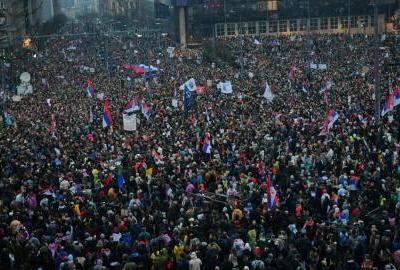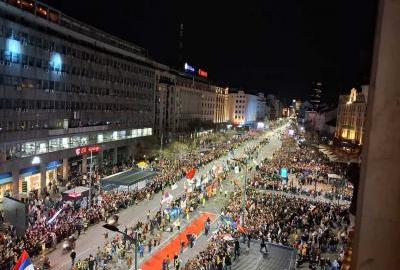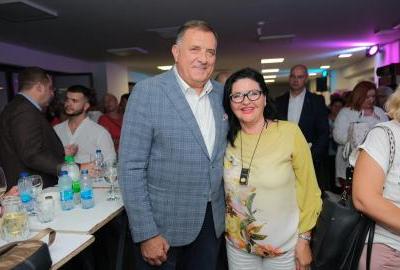Žurnal in English
CANDIDATE FOR THE NEW SERBIAN LEADER: Vuk in Vučić's Place
Aleksandar Vučić will disappear, but the carefully nurtured authoritarian culture will remain. Voters have always preferred to trust demagogues, populists, and those who offered to relieve citizens of the heavy burden of responsibility. Sweet lies have always been more sought-after than bitter truths.

Mass protests against violence have awakened hope that radical change in the system in Serbia is still possible. In a society that has long been decaying in despair, trapped for decades in a vicious cycle, even the slightest glimmer of hope appears as a monumental occurrence. It's not just fear that fuels our desires; it's also the hope that arises as soon as the smallest possibility for change emerges. We immediately begin to dream utopian dreams of a democratic society composed of free individuals brimming with tolerance and love for the rule of law, a realm of justice that will be established in our little corner of the world as soon as possible.
Toppling the criminal regime of Aleksandar Vučić is necessary but not sufficient for the creation of a different, free, and democratic society. It will only be the first step towards building a different Serbia if we can overcome centuries-old inertia towards an authoritarian model, towards the rule of one person and one party, which the majority of our society still gravitates towards. Slobodan Milošević and Vojislav Koštunica have disappeared from the political scene, and Vojislav Šešelj only exists in media traces, but their supporters haven't gone anywhere, nor have they magically transformed into pro-European democrats.
Guardians of the Authoritarian Tradition
Aleksandar Vučić will disappear, but the carefully nurtured authoritarian culture will remain. Politicians of a different calibre, like Ante Marković, Ivan Đurić, or Zoran Đinđić, have never enjoyed popularity among the electorate. And how could they be popular when they advocated radical reforms, and changes in lifestyle, when they, like Đinđić, preached individual responsibility for one's own fate and mocked conspiracy theories? Voters have always preferred to trust demagogues, populists, and those who offered to relieve citizens of the heavy burden of responsibility. Sweet lies have always been more sought-after than bitter truths.
There is no doubt that there is a significant number of citizens who long for real change, a complete break from the corrupt system established since the Eighth Session and further solidified through wars, crimes, plunder, and destruction, with its latest poisonous offshoots incinerating under the progressive regime. It makes one dizzy to casually glance at the garbage that has accumulated in the Serbian replica of the Augean stables. It is challenging to compile a list of biohazardous waste declared as regular inventory and national treasures, let alone confront the gigantic legacy of destructive politics and ideology and start the process of shovelling.
There are political leaders who don't feel dizzy when witnessing the dismantled Serbian society. On the contrary, they see the disintegration as an opportunity for themselves. Instead of radical rupture and dismantling the mechanism of self-destruction, they would rather preserve the continuity of anomie, as Vojislav Koštunica did at a decisive historical moment, nurturing the legacy of Slobodan Milošević's criminal regime. They aspire to be caliphs in place of the caliph, and Vučić in place of Vučić. Perhaps they would introduce some minor cosmetic changes, but they would leave the roots and causes of the problems untouched. As one anonymous Twitter user eloquently put it: "Here, people don't want to heal the nation from drugs; they want to change the dealer. They claim that this one is shortchanging them. They promise that a gram will be a gram. And that it will be purer."
Right-wing contenders for the throne
There are many candidates vying for the position of the new Serbian leader, making it difficult to assess who has the greatest chance of ascending to the coveted throne. Boško Obradović from Dveri is a typical pretender to the throne. He would further intensify authoritarian tendencies, definitively derail Serbia's European path, tether the Serbian ship to Mother Russia, curtail civil rights for those who do not fit into his narrow worldview (for example, the LGBT population), work towards the unification of "all Serbian lands" (meaning engaging in warfare), and strengthen the ties between the church and the state even further if that is even possible. In short, Obradović aims to replace the progressive Vučić with the Vučić of his radical phase, in a pure, unadulterated state.
Variations on the radical agenda are also offered by Bosko's colleagues in the right-wing and Putinophile camp: Miloš Jovanović, the leader of the New DSS; Milica Đurđević Stamenkovski, the president of Srpski sabor Zavetnici; and Vojislav Mihailović, the leader of the Movement for the Restoration of the Kingdom of Serbia and the grandson of Draža Mihailović. They have come up with the brilliant idea of treating the body, which is fatally poisoned by nationalist arsenic, by injecting stronger doses of the same toxic liquid. And that is where their political inventions begin and end, unless Russia miraculously wins the war against Ukraine, continues its conquests in Europe, and reaches our region. In that case, these so-called professional patriots would compete for the position of viceroy and governor-general of the Russian protectorate.
However, the right-wing team does not participate in the protests; it is not their place, and their chances of seizing power in the future are slim. They are too rigid in their views, and their radicalism has been purified to an excessive degree, making it less appealing to the voting consumers. There are candidates on the other side of the political spectrum as well, but in our country, everything is mixed up, and it is difficult to determine with reliable precision where the right-winger ends and the leftist begins.
Deniers of Kosovo and deniers of genocide
The leader of the Ecological Uprising, Aleksandar Jovanović Ćuta, demonstrates significant populist tendencies. He wouldn't impose sanctions on Russia, and Kosovo is an inseparable part of Serbia, as clearly stated in the Constitution (which was adopted for the sake of that fiction, but let's not spoil the idyll). Gornje Nedeljice today are the same as Kosovo in 1999, following the well-known pattern. Recently, a member of this party, writer and visual artist Dejan Atanacković, was expelled from the Ecological Uprising for opposing the proposal of the People's Party to hold a referendum on the Franco-German plan for Kosovo.
Jovanović and the Ecological Uprising fully supported the idea of a referendum, while Atanacković strongly opposed it, as well as the entire pseudo-patriotic propaganda. "In short, it advocates a policy that focuses on territory rather than people, fiction rather than reality, legalistic clichés rather than fighting against regime criminality, which logically results in a complete lack of interest in the real interests of both the citizens of Serbia and the Serbian community in Kosovo, the hostages of Belgrade, and the victims of the Serbian List's terror," wrote Atanacković, stating a few elementary truths. As a result, his colleagues expelled him from the party he co-founded. Kosovo is one of the key tests to distinguish serious politicians from demagogues, as the latter always use the "sacred Serbian land" as an eternal excuse for preventing any real change in Serbia.
There are also candidates among non-partisan figures, with Savo Manojlović from the Kreni-Promeni movement standing out. He regularly practices the art of not giving up Kosovo professionally and has been quite successful in denying the Srebrenica genocide. Savo knows how to vehemently criticize both war profiteers and "peace profiteers," as he sees no difference between Željko Ražnatović Arkan and Srđa Popović. All those relics don't concern him at all because he belongs to the younger generation that has no connection to the past, although it strikingly resembles countless manipulators we have witnessed before, reciting texts written by various propagandists from the memorandums, for the millionth time.
The False European Path
The most serious contender for the new Vučić is the President of the Narodna Stranka (People's Party), Vuk Jeremić. His party is among the organizers of the protests, although it is difficult to categorize them as pro-European forces. Jeremić has taken a step back and put party functionary and member of parliament Miroslav Aleksić at the forefront. On social media, there is a campaign proposing Aleksić as the leader of the protests, even though nobody requested it, and it is unnecessary. Like many similar colleagues, Aleksić does not speak out on important political issues, sticking to general statements about fighting against the dictatorship without clear positions on the political agenda behind that fight and what Serbia should be like after the downfall of the ruling Serbian Progressive Party.
However, explicit questions were posed to Aleksić on Twitter regarding key issues, and he stated his opinions: "Although I believe that raising these issues at this moment is an unnecessary diversion, I will answer out of respect. A crime occurred in Srebrenica, but it was not genocide. Kosovo is part of Serbia, as defined by the Constitution. I am against NATO membership. Serbia should continue its path towards EU integration." Firstly, all the mentioned topics are crucial for Serbia's future, for determining its path, and therefore, what Serbian society will look like after Vučić.
Secondly, everything Aleksić listed aligns with what Vučić says, so it's not entirely clear how desired changes will occur if the ruling policy is replaced with an almost identical political agenda. And thirdly, there can be no European integration without respecting the decisions of international courts, without recognizing the genocide in Srebrenica, and without resolving the issue with Kosovo, namely, recognizing it as an independent state. Therefore, it's a deception of voters, the same kind of manipulation carried out by Aleksandar Vučić, pretending to be on the European path while doing everything in his power to prevent Serbia from becoming a member of the European Union.
After Vučić - Vuk
In the meantime, Aleksić's boss, Vuk Jeremić, gives an interview to the Kremlin's propaganda outlet, Russia Today, saying what pleases the Russian ear—that Serbs in Kosovo are the most endangered people in Europe. He made similar remarks a few years ago regarding Serbs in Montenegro, just like Vučić's propaganda outlets have been doing all along. Jeremić had a brilliant idea for defending Kosovo, urging the authorities to write to China and Russia and ask them to vote against Kosovo's membership in the United Nations. Of course, he wouldn't impose sanctions on Russia under any circumstances, disregarding the fact that the Russian horde is killing and wreaking havoc in Ukraine.
The Narodna stranka (People's Party) has consolidated all the dogmas of the dominant nationalist worldview, albeit in a somewhat softer form compared to the Dveri and Zavetnici, similar to the Democratic Party of Serbia during Vojislav Koštunica's time. This makes it an ideal refuge for future defectors, at least for those who haven't compromised themselves too much. From today's perspective, it may not seem likely that the Narodna stranka could strengthen to such an extent and become the leading force in the post-Vučić political scene. However, we should remember that even the DSS was a minor party until October 5th, and after the victory, everything changed overnight as membership flooded in from all sides.
We should not foster false hopes, but there is no reason to despair either. For Serbia to once again become an autocracy of the Vučić type, it is not enough for the authoritarian tendencies of a politician to align with the yearnings of the majority for a new leader. It also requires very specific abilities on the part of the pretender to fully subjugate the entire society, strictly control the electorate, and capture all institutions. Fortunately, such talents are rare. Koštunica failed to achieve this, despite the social conditions being conducive to it.
However, there are reasons for optimism. After Vučić, Serbia will breathe a little more freely, and it will also be easier for our neighbours. The fight for a European and democratic Serbia has only just begun, and we will have to confront more charlatans, demagogues, and manipulators along the way. In this struggle, it would help us to listen more carefully to those rare sincere and honest individuals who speak bitter truths to us, both about the ruined present and the recent inglorious past.
(zurnal.info)








